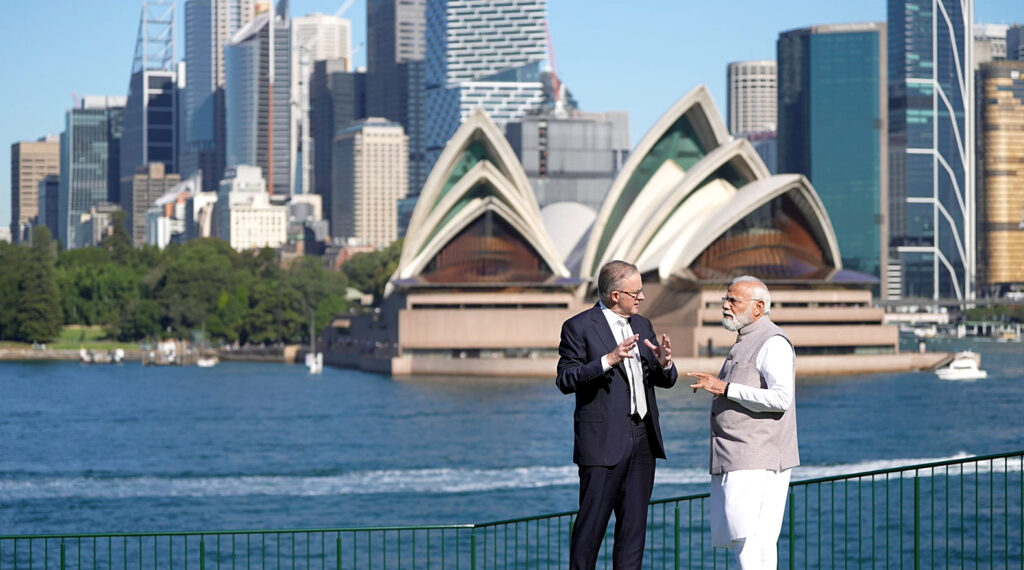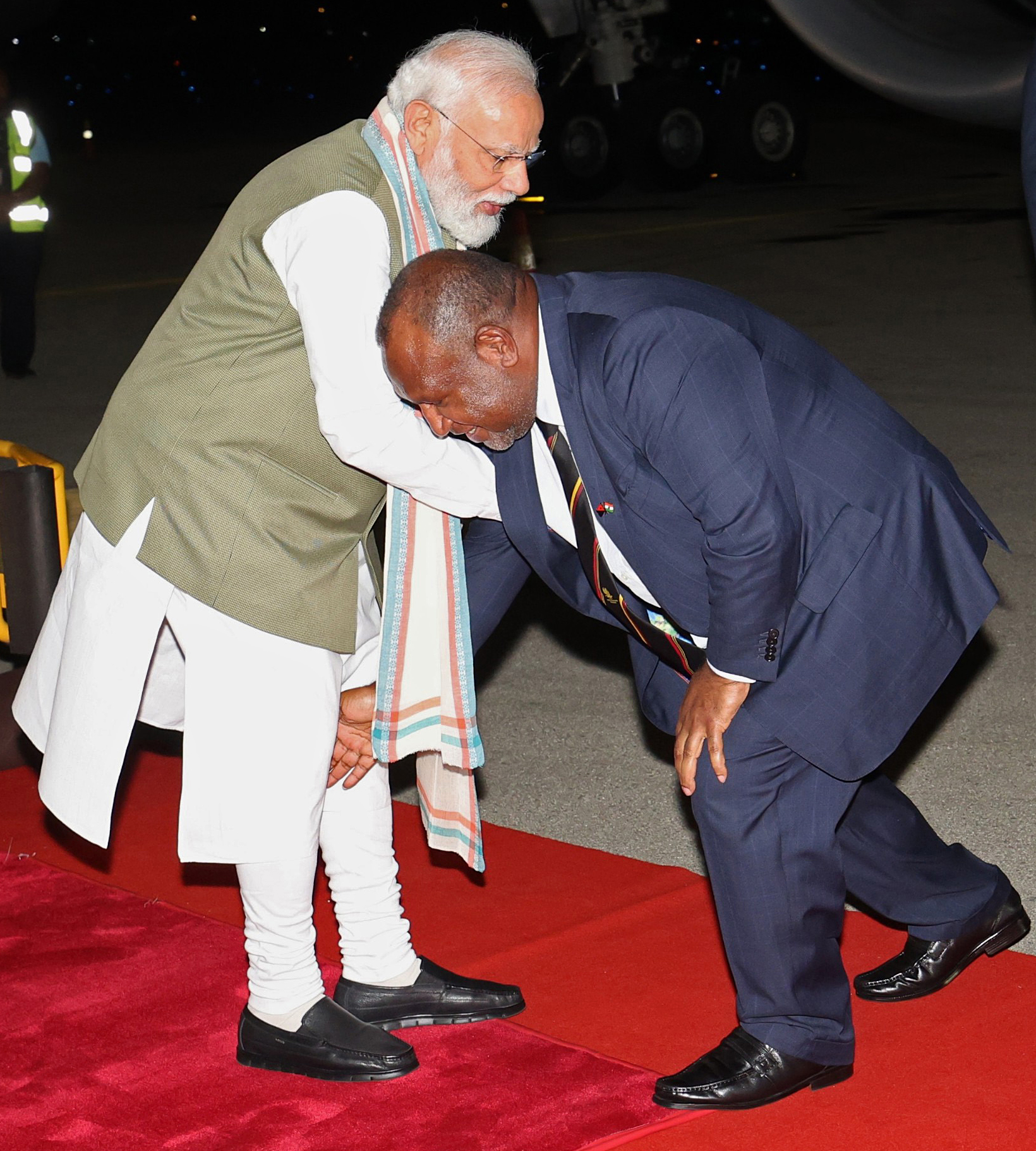In the largest democracy on earth, citizens and state leaders should not take the law into their own hands or take actions whose visuals beamed to billions of homes abroad tarnish India’s image and go against the positivity which the Prime Minister creates on his visits globally.
After a bitter defeat in the recently held Karnataka state elections, the warmth and bonhomie shown, media attention focused and praise and accolades showered on him in Hiroshima, Papua New Guinea and Australia would have been a much needed therapeutic rejuvenation for Prime Minister Narendra Modi. The American, the Australian and the Papua New Guinea leaders seemed to be vying with each other in choosing the right compliments for the Indian PM. The US President, Joe Biden, who came to Modi and hugged him warmly stressed his immense popularity among Indian Americans who wish to attend the dinner next month in Washington in his honour and jocularly said that given Modi’s popularity Biden might have to request for his autograph. More seriously, he acknowledged Modi’s positive contribution: “You made a fundamental shift in climate. You have influence in Indo-Pacific.” In fact, he believed Modi was impacting everything including the Quad and was demonstrating that “democracies matter”.
PNG PM James Marape, who came to the airport to receive the Indian PM, tried to greet him in the typical Indian tradition by touching his feet and calling him his Guru/the “Vishwa Guru” and leader of the Global South. He urged him to take up their concerns and interest at international forums. Modi became the first Indian PM ever to visit PNG, whose increasing strategic significance was underlined by the fact that the US has signed a security agreement with them to counter China’s footprints which had signed an agreement with the Solomon Islands last year to establish its naval bases.
PM Modi held separate meetings with his Fijian counterpart, Ligamama da Rebuka, who bestowed upon Modi the Companion of the Order of Fiji, the highest civilian award. During his visit to Port Moresby, the Governor General of PNG conferred on Modi the country’s highest civilian award: Grand Companion of the Order of Logohu (GCL). In stark contrast to China’s approach, in his 12-point Action Plan for the Pacific Island Countries (PIC), Modi unfolded a very persuasive offer of partnership. “We are ready to share our capabilities and experiences without any hesitation. Whether it is digital technology or space technology, whether it is health security or food security ,whether it is climate change or environmental conservation…we are with you every way.”
In the Qudos Bank Arena in Sydney, where PM Modi was given a rock star like reception reminiscent of Madison Square Garden in New York and the “Howdy Mody” event in Houston in the US, by 20,000 strong people of Indian origin. As usual, the audience was given a tour d’ horizon of what has been done by his government in India in the last nine years and how a New India is getting transformed and surging ahead and how the whole world’s eyes are now on India and how the world wants to know what India is thinking about. His exceptional oratory and the grand, inspiring and enticing vision he paints for India enthuse his audience. He creates overwhelmingly positive vibes, generates optimistic and forward looking outlook and an abundance of dynamic energy, all of which trigger off a “we can do it” feeling. He is the most effective brand ambassador of New India, which he is assiduously trying to build and which will play a significant role in addressing the global commons and be a forceful voice of the Global South.
According to him, mutual trust and respect are the bedrock of India’s relations with Australia which have graduated from 3Cs (Commonwealth, cricket and curry) and 3 Ds (democracy, diaspora and dosti, or friendship) to 3Es: energy, economy and education. PM Modi drew PM Albanese’s attention to attacks on Indian temples and students and increased activities of pro-Khalistani elements.
While welcoming him in the overflowing and electrifying arena, the Australian PM Albanese called Modi “the Boss”. This summed up his respect, admiration and was a public acknowledgement of Modi’s unmatched hold on the psyche of the Indian diaspora which had given him a similar rousing reception in 2014 in Sydney’s Olympic Park. That time he had told his enthusiastic audience, “yes, we want to create the India you are dreaming of…” This time around, he could tell them what has already been created.
Though Japan’s PM Kishida tried to reach out to the emerging economies of the Global South by inviting India, Brazil, Indonesia and Vietnam, the G7 essentially remains a group of Western economies led by the US—with Japan being the only non-Western member. Like the UNSC, it doesn’t reflect the realities of today; though holding half of the global wealth it accounts of 1/3 of the GDP and represents only 10% of the world population. The second largest economy of the world, China, and India the fifth largest economy and the most populous country in the world are not its members. Expectedly, the G7 issued a polarized statement on Ukraine criticizing Russia for its “illegal, unjustified and unprovoked aggression on Ukraine” and vowing to support her as long as it takes but offering no way out to end the crises.
Speaking at the welcome reception for the PM on his return, External Affairs Minister, S. Jaishankar, who was an eyewitness to all the engagements of the PM on his trip to the three countries, disarmingly said, “In 45 years of my diplomatic life, I have never seen such scenes of ecstatic welcome for any leader.” What could be a greater proof of the huge impact of Modi phenomenon abroad than the fact that in Pakistan where the government and the people often accuse India of hundreds of wrongdoings were clean bowled by the Modi hurricane. The media and young Pakistanis were gushing over what Modi has achieved and contrasting the level to which Pakistan has descended.
So, what’s the secret behind the Modi magic? It’s all about leadership. People look up to a leader who emanates self-confidence, self-belief and who leads from the front. A leader who offers an all embracing vision for development and progress. A leader who inspires and energises and who works tirelessly and introduces policies and schemes which can change the lives of millions of people for the better. A leader who defends the nation against foreign aggression and who also leads the nation imaginatively and inspiringly in the face of a national calamity like the Covid-19 pandemic. A leader who is not afraid of trying out new and out of box ideas. A leader who is prepared to experiment and ready to address problems of all sectors and sections of society: ordinary people, farmers, trade, industry, business, academia, defence, covering all—children, women, elderly. A leader who isn’t afraid of failures: who believes it’s better to have tried and failed than never to have tried at all. Above all, a leader who can sense the pulse of the people and who has the ability to connect and communicate with people of different backgrounds and different age groups, and help them live their dreams.
Narendra Modi is blessed with all these qualities; he is an exceptional leader. He is a 24×7 Prime Minister always on mission mode. If hundreds of policy decisions and schemes introduced by him are implemented in letter and spirit, he will go down as the most transformative and people friendly Prime Minister of India ever.

In the field of international relations too, he takes out-of-box initiatives. Inviting all the leaders of the neighbouring countries to his inauguration in 2014 was such an initiative, as was later treating all the ASEAN leaders as chief guests at the Republic Day parade in January 2018. And for the first time, an American President, Barack Obama was invited to be the chief guest at the Republic Day parade on 26 January 2015. In quest of better relations with Pakistan and China also he has experimented with an out of the box approach but the results haven’t been as expected. Dropping by Lahore on the way back from Kabul to wish the then Pakistani PM Nawaz Sharif on 25 December 2015 and receiving the Chinese President on the Sabarmati front in Ahmedabad (September 2014) and holding informal summits in Wuhan (April 2018) and Mamallapuram (October 2019) were laudable and well-intentioned initiatives but the response from these two neighbors turned out to be largely negative.
Though he hadn’t visited many countries before he became the PM, he has become the most travelled PM of India who seems supremely confident and at ease at summits with his counterparts and world leaders at international forums. He has raised personal chemistry to an art form, with the result that though his counterparts might change and may be individuals of totally different personalities but he is able to strike the same warm chemistry with each of them. Just take the case of the US, UK, Australia and Japan. He has enjoyed personal chemistry with Obama, Donald Trump and now Joe Biden. He has been a great friend with David Cameron, Boris Johnson and now Rishi Sunak of the UK. He was a great pal with Tony Abbott and now Albanese in Australia. Shinzo Abe was very close to Modi and the current Japanese PM Kishida also enjoys warm vibes . Can all this happen just because of Jadu Ki Jhappi? It’s Modi Magic in action.
Nowadays, there is so much talk of democracy vs authoritarian rule and PM Modi and President Biden have talked about how democracies matter and deliver. In the largest democracy on earth, citizens and state leaders should not take law into their own hands or take actions whose visuals beamed ro billions of homes abroad tarnish India’s image and go against the positivity which the PM creates on his visits globally. It takes a long time and hard work to generate goodwill and positive
Surendra Kumar is a former Ambassador of India.

